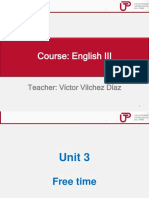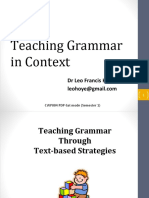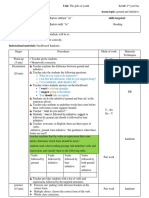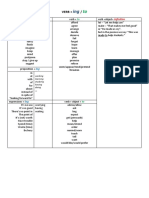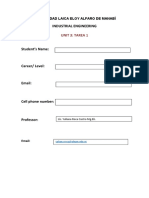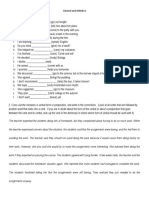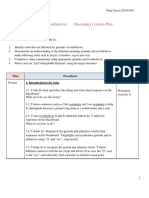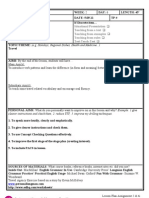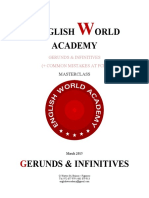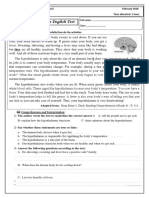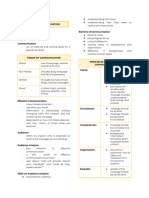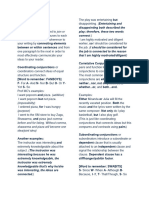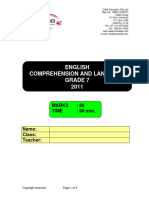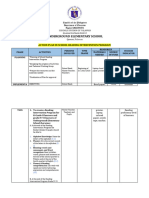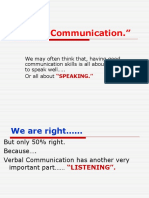Introduction
I
• Check answers as a class. Point out the following word
Map of resources order: verb + not + infinitive, e.g. decide not to do.
IA Vocabulary KEY
Student’s Book, page 4; Workbook, page 4 1 verb + -ing form: spend time (listening); mind (putting
up with)
IB Grammar
2 verb + infinitive: hope (to be); decide (not to do);
Student’s Book, page 5; Workbook, page 5 choose (to be)
IC Vocabulary 3 verb + object + infinitive: advise (me to do)
Student’s Book, page 6; Workbook, page 6 4 verb + object + preposition + -ing form: warn (me
against doing)
Photocopiable: Vocabulary Review
5 verb + preposition + -ing form: apologise (for being)
ID Grammar
Student’s Book, page 7; Workbook, page 7 Exercise 3 page 4
Photocopiable: Grammar Review • Students choose the correct form of the verb.
• Check answers as a class.
Classroom Presentation Tool Unit I
KEY
End of unit 1 copying 2 to study 3 visiting 4 to go
Short Tests: Unit I 5 to apply 6 volunteering
Exercise 4 page 4
IA Vocabulary • Go through the verbs and check meaning and
pronunciation. Students match them with the correct
Friends patterns.
LESSON SUMMARY
• Check answers as a class. Note that propose has two
structures. Then ask students to categorise the verbs
Grammar: Verb patterns in exercise 3. Note that admit can be followed by two
Speaking: Talking about friends and friendship; talking structures: admit + to (preposition) + -ing form
about memorable events or admit + -ing form.
SHORTCUT KEY
• To do the lesson in 30 minutes, keep the lead-in and 1 verb + -ing form: deny, keep, mention, propose
exercise 1 brief and set exercise 9 for homework. 2 verb + infinitive: afford, manage, offer, promise, propose
3 verb + object + infinitive: beg, persuade, remind, tell
LEAD-IN 2–3 MINUTES 4 verb + object + preposition + -ing form: accuse (of ),
• Play hangman on the board with the word friendship. blame (for), thank (for)
• Ask students to call out any nouns, adjectives, or verbs that 5 verb + preposition + -ing form: end up, insist on, think
they associate with friendship, e.g. friend, friendly, hang out. (of / about), wonder about
The verbs from exercise 3 are as follows:
Exercise 1 page 4 1 verb + -ing form: admit, enjoy
• Focus attention on the photo and ask: What is the girl on 2 verb + infinitive: agree, hope
the right doing? (She’s taking a photo of herself with her 3 verb + object + infinitive: encourage
friends.) You might like to teach selfie /ˈselfiː/ (a photo 4 verb + object + preposition + -ing form: praise
of yourself that you take with your smartphone, usually 5 verb + preposition + -ing form: admit
to put on a social networking site) and say: She’s taking a
selfie with her friends. Exercise 5 page 4
• Focus attention on the title of the forum and ask students • Students complete the dialogue.
to read the posts. In pairs, they should then tell each other • Check answers as a class. You could ask two students to
what they think of the comments and think of two more read out the dialogue to the class.
qualities that are important in a best friend.
KEY
• Elicit a few opinions and suggestions. 1 thinking 2 asked 3 reminded 4 insisted
5 accused / accusing 6 apologise
Exercise 2 page 4
• Explain that when one verb follows another, the form of Exercise 6 page 4
the second verb depends on the first. • Focus attention on the words anger /ˈæŋɡə(r)/, anxiety
• Ask students to match the highlighted verbs in the forum /æŋˈzaɪəti/ and shame /ʃeɪm/. Check pronunciation.
post with the correct verb pattern.
Introduction 1
�• Ask students to find a corresponding adjective in the
Extension: Fast finishers
dialogue. With a stronger class, elicit the adjectives first
and then ask students to read the dialogue again to check. Ask fast finishers to choose three verbs from group 2 and
write two sentences to illustrate the difference in meaning
KEY between verb + infinitive and verb + -ing.
anger – angry; anxiety – anxious; shame – ashamed
For further practice of word families: Exercise 10 page 4
Vocabulary Builder IA page 117 • Tell students about something you did recently, e.g. Last
1 ease, easily, hopeful / hopeless, hope, hopefully / week, I went camping with a friend and her family. It started
hopelessly, laziness, laze, lazily, beautiful, beautify, raining on the first day of the holiday and it continued to rain
beautifully, creation, creative, creatively, pleasure, for five days!
pleasant, pleasantly, sadness, sadden, sadly, surprising, • Ask students to work in pairs and tell each other about
surprise, surprisingly, annoying, annoy, annoyingly something they did recently.
2 1 laziness 2 surprising 3 beautifully • Monitor and check students are using the correct form of
4 annoyingly 5 creatively 6 saddened 7 ease the verbs.
8 pleasant 9 hopefully
Extra activity
Exercise 7 page 4
Ask students to write a short paragraph beginning:
• In pairs, students give their opinion on Amy’s feelings towards I’ll never forget meeting my best friend. They should try to
Lily and then say what they would do in a situation like this.
use verbs from exercises 4 and 8.
• Monitor and check students’ use of would / wouldn’t to talk
about imaginary situations.
Lesson outcome
Language note: Verb + infinitive or -ing • If you are using the Classroom Presentation Tool, first do
the lesson closer to review what has been covered in this
forget to do = not remember to do something that you
lesson.
ought to do
• Ask students: What have you learned today? What can
forget doing = not remember something that happened
you do now? and elicit answers: I can talk about friends
in the past
and friendship. I can talk about something I did recently. I
go on to do = do something after completing understand different verb patterns. I understand the different
something else meanings of verbs that are followed by the infinitive or the
go on doing = continue an activity without stopping -ing form.
remember to do = not forget to do something; actually do
what you have to do
remember doing = have or keep an image in your memory
IB Grammar
of an action that you did in the past
Present and future tenses
stop to do = no longer continue to do something for a
time in order to do something else LESSON SUMMARY
stop doing = no longer continue to do something Grammar: Present simple and continuous; will and going to
try to do = make an effort to do something SHORTCUT
try doing = use, do or test something in order to see if it is • To do the lesson in 30 minutes, keep the lead-in and
good, suitable, etc. exercise 1 brief.
LEAD-IN 2–3 MINUTES
Exercise 8 page 4
• Go through the Learn this! box together and ask students • Act out an annoying habit such as continually tapping
to put the verbs into group 1 or group 2. your foot on the floor whilst sitting down. Ask: Does this
annoy you? Encourage students to answer Yes. / No, it
• Check answers as a class and make sure students
doesn’t bother me. Then ask them to suggest a habit that
understand the difference in meaning when the verbs in
annoys them.
group 2 take the infinitive or -ing.
KEY Exercise 1 page 5
1 continue, like, prefer, start • Focus attention on the list of annoying habits. In pairs,
2 forget, go on, remember, stop, try students answer the questions about them.
• Ask some students to share their answers with the class.
Exercise 9 page 4
• Students choose the correct verbs. Exercise 2 $ 1.02 page 5
• Check answers as a class. • Tell students that Andy is complaining about his friend
KEY Tom’s annoying habit.
1 to go / going 2 to tell 3 to laugh 4 to talk • Play the recording while students read. They have to
5 to play / playing 6 to rain / raining identify the fault and answer the questions in pairs.
• Elicit the answers and students’ opinions and reasons.
Introduction 2
�KEY
He always talks about himself.
For further practice of will and going to:
Grammar Builder I.2 page 122
Transcript 1 1 ’ll see 2 ’m going to meet 3 ’s going to crash
See Student’s Book page 5. 4 ’ll give 5 ’ll be 6 Are you going to see 7 going
to fall 8 ’ll have 9 won’t forget 10 ’ll do
Exercise 3 page 5
• Go through the Learn this! box together. Students then Exercise 7 page 5
match the highlighted sentences with the correct rules.
• Go through the questions together, eliciting the correct
• Check answers as a class. tenses for the answers. Note that sometimes more than
KEY one answer is possible. With a weaker class, you could
a he never takes an interest in other people also elicit the reasons why.
b That’s the personality he’s got. KEY
c Our first lesson tomorrow is English. 1 present simple (habits and routines) / present continuous
d Next time you see him with always (describing annoying behaviour)
e his attitude is really putting me off him 2 present simple (habits and routines)
f He’s always talking about his life 3 present continuous (future arrangements) / going to
g I’m playing football this evening (when we have already decided what to do)
Exercise 4 page 5 4 will (based on what we know or just a guess)
5 going to (when we have already decided what to do) /
• Students find more examples of the present simple present continuous (future arrangements)
and continuous in the dialogue and match them with
the rules. Exercise 8 page 5
• Check answers as a class. Note that Jessica uses the • In pairs, students take turns to ask and answer the
present simple in You don’t seem too happy since seem is a questions in exercise 7 using the tenses they identified.
stative verb and is usually used in the simple form. Monitor their use of present and future tenses.
KEY • Make a note of any mistakes you hear and write them on
a he never asks the board for the class to correct.
b he doesn’t care about anyone else; it annoys you;
it irritates me; I don’t see Extra activity
e what I’m doing Ask students to write another version of the dialogue in
Exercise 5 page 5 exercise 2. They should choose a different annoying habit.
They can choose one of the habits in exercise 1 or use
• Ask students to read the text and complete it with the their own idea.
correct form of the verbs, present simple or continuous.
They should write both forms if both are possible.
• Check answers as a class. For item 2, point out that the Lesson outcome
present continuous rather than the present simple • If you are using the Classroom Presentation Tool, first do
suggests a feeling of annoyance. the lesson closer to review what has been covered in this
lesson.
KEY
1 text 2 are always using / always use 3 go out
• Ask students: What have you learned today? What can you
do now? and elicit answers: I can use different tenses to talk
4 am using 5 am revising 6 start / are starting
about the present and future.
7 are trying 8 helps
For further practice of the present simple and
continuous: Grammar Builder I.1 page 122
IC Vocabulary
1 1 a 2 b 3 b 4 a 5 a / b 6 b 7 a Life events
LESSON SUMMARY
Exercise 6 page 5
• Go through the Learn this! box together and elicit the Vocabulary: Stages of life; life events
missing verbs. Speaking: Describing life events
• Ask students to look at the underlined sentences in the SHORTCUT
dialogue and match them with the correct rules. • To do the lesson in 30 minutes, keep the lead-in and
KEY exercise 1 brief. Set exercise 8 for homework.
a going to b will c going to d will e will
LEAD-IN 2–3 MINUTES
Are you going to do anything about it? – c
I’ll tell him if you want – e • Focus attention on the photo and ask students to
I’ll speak to him then. – d describe it, e.g. It’s the boy’s birthday. He’s five. He’s blowing
he won’t get angry – b out the candles on his birthday cake.
it looks like it’s going to rain – a • Ask a few students: Who is the youngest person in your family?
How old is he/she? Who is the oldest person? How old is he/she?
Introduction 3
�Exercise 1 page 6 Exercise 4 page 6
• In pairs, students take turns to tell each other about two • Go through the adjectives in the questions together and
things in the list. Point out that they will need to use check meaning and pronunciation, especially obsessed
remember + -ing form to talk about their memories. /əbˈsest/, curious /ˈkjʊəriəs/, addicted /əˈdɪktɪd/ and
• Ask a few students to share their memories. sensitive /ˈsensətɪv/.
• Students complete the questions. Point out that
Exercise 2 $ 1.03 page 6 sometimes there is more than one correct answer.
• Go through the stages of life together and check meaning • Check answers as a class.
and pronunciation, especially adult /ˈædʌlt/ or /əˈdʌlt/,
centenarian /ˌsentɪˈneəriən/, infant /ˈɪnfənt/, elderly KEY
/ˈeldəli/ and aged /eɪdʒd/ in middle-aged. 1 with 2 about 3 at 4 to 5 to 6 with / about
7 by / at 8 of
• Tell students they will hear someone describing seven
people. Play the recording for students to match the For further practice of adjective + preposition:
people with the correct stage of life. Vocabulary Builder IC page 117
• Check answers as a class.
3 1 with 2 of 3 about 4 to 5 from 6 on
KEY 7 at 8 by
1 be an infant
2 be a centenarian Exercise 5 page 6
3 be in your teens • Students discuss the questions in exercise 4 in pairs.
4 be a toddler With a weaker class, elicit some phrases for agreement
5 be elderly (I think you’re right. / I agree with you.) and disagreement
6 be an adult (I don’t agree. / I completely disagree. / I think you’re wrong.).
7 be middle-aged
• Ask a few students for their opinions and reasons.
Transcript Encourage discussion if there is disagreement.
1 She’s started to eat solid food, but she hasn’t learned to
walk yet. Exercise 6 page 6
2 My great-grandma turned 100 just last week. Isn’t that • Ask students to complete the life events.
amazing! • Check answers as a class, helping with meaning and
3 My younger brother wants to study medicine at university, pronunciation.
but he’ll need to get really high marks in his exams this
summer to get a place. KEY
4 She’s at a lovely age – really curious about the world – but 1 born 2 fall 3 get 4 have 5 learn 6 leave
you have to keep a close eye on her. She has very little 7 pass 8 settle 9 start 10 become
sense of danger.
Exercise 7 page 6
5 Even though she has some health problems, my mum
is still very active. She does voluntary work three days a • Students complete the sentences with the correct words
week in a charity shop and has just joined a hiking group. from exercise 6. Point out that when the missing word
She says she won’t let old age slow her down! is a verb, students should write the correct form. With a
6 It’s not like when I was a student. I’ve got so much more weaker class, do the first item together.
responsibility now. My job’s really demanding, and I have • Check answers as a class.
to pay for my apartment too. KEY
7 The children left home last year, and it’s a bit quiet around 1 born, moved, grew
the house now. We’ll have to start going out more often, 2 left, job, go, career
like we did in our twenties! 3 fell, engaged, got
4 grandparent, retire, a business
Exercise 3 page 6 5 buy, inherited, passed away
• Explain the task and go through the example together. 6 emigrated, settled, started
With a weaker class, check that students know how to 7 split, divorced, brought up
talk about obligation or necessity (have to / don’t have to) 8 left, started school, to drive
as this language will be useful.
• In pairs, students talk about the changes between the Exercise 8 page 6
stages of life. Monitor and help where necessary. • Students complete the sentences with words from
• Ask some students to share their ideas with the class. exercise 6. Remind them that when the missing word is a
verb, they should write the correct form.
Extra activity: Fast finishers • Check answers as a class.
• Write on the board: Would you rather be in your teens KEY
than in your twenties? Why? / Why not? 1 born 2 emigrated 3 left 4 been 5 job 6 fell
• Ask fast finishers to discuss the question in pairs. 7 got 8 married 9 moved 10 settled 11 family
12 brought 13 became
Introduction 4
� Extra activity Extra activity
• Ask students to choose an older family member and Ask students to write true sentences about themselves or
write a short biography. They should include the most their family using the past simple, past continuous and
important events in the person’s life and a photo if past perfect. They should write one for each rule in the
possible. Learn this! box.
• Display the biographies on the wall for the class to read.
Exercise 3 page 7
Exercise 9 page 6 • Students complete the sentences.
• In pairs, students take turns to describe life events in • Check answers as a class.
their family. KEY
• Ask some students to tell the class some interesting facts 1 learned, was studying
that they have learned about their partner’s family. 2 was snowing, were driving
3 grew, moved
Lesson outcome
4 got, had left
• If you are using the Classroom Presentation Tool, first do 5 emigrated, started, was living
the lesson closer to review what has been covered in this 6 met, hadn’t seen
lesson.
• Ask students: What have you learned today? What can you For further practice of past tenses:
do now? and elicit answers: I can talk about my family and Grammar Builder I.3 page 122
life events. I can use some adjectives + prepositions. 1 1 was shining, were singing, left 2 saw, realised
3 were (you) doing, called 4 were waiting, started
ID Grammar 5 walked, sat down, started 6 was living, moved
7 played, was living 8 was leaving, came out
Past tenses 2 1 hadn’t been 2 had always kept 3 hadn’t told
4 had been 5 Had (you ever) visited
LESSON SUMMARY
6 had got up 7 had known
Grammar: Past tenses review; present perfect simple and
continuous Exercise 4 page 7
SHORTCUT • Go through the Learn this! box together and then ask
• To do the lesson in 30 minutes, keep the lead-in and students to find sentences in exercise 2 to illustrate each rule.
exercise 1 brief. Set exercise 7 for homework. • Check answers as a class.
LEAD-IN 2–3 MINUTES KEY
a sentence 8
• Write get married on the board and brainstorm words b sentence 7
connected to getting married, e.g. wedding, church, bride,
c sentence 9
groom, bridesmaid, bouquet, confetti, reception, honeymoon.
d sentence 6
Help students with any unknown words.
e sentence 2
Exercise 1 page 7
• Focus attention on the photo and ask students to Extension: Fast finishers
describe it. Monitor their use of tenses, e.g. The bride and Ask fast finishers to write true sentences about
groom are leaving the church. They’re smiling and they look themselves or their family using the present perfect
happy because they have just got married. Some guests are simple and continuous. They should write one for each
throwing confetti at them. rule in the Learn this! box.
• Ask a few students to tell the class about a wedding they
have been to. Exercise 5 page 7
• Students choose the correct form of the verb.
Exercise 2 page 7
• Check answers as a class.
• Go through the Learn this! box together and then ask
students to find four sentences to illustrate the rules. KEY
• Check answers as a class. 1 been reading, finished
2 been jogging
KEY 3 married
a sentence 1 4 been raining
b sentence 4 5 bought
c sentence 3 6 been studying
d sentence 5
Introduction 5
� For further practice of the present perfect simple
and continuous: Grammar Builder I.4 page 123
1 1 ’ve been searching, haven’t found 2 ’ve visited,
’ve never seen 3 Have you seen, ’ve been looking
4 ’ve just been talking 5 been eating
6 Have you seen, ’s been working 7 ’ve played
8 ’ve been watching 9 have won 10 Have, taken
For further practice of stative verbs:
Grammar Builder I.5 page 124
1 1 ’re behaving, don’t understand, mean 2 are you
laughing, doesn’t fit 3 ’m carrying, know, contains
4 Do you like, doesn’t matter, don’t mind
5 need, don’t care, ’m enjoying
2 1 was looking 2 had 3 ’m seeing 4 was thinking
5 were having 6 think 7 see 8 looks
Exercise 6 page 7
• Ask students to read the text and complete it. They should
use the past simple, past continuous, past perfect, present
perfect simple, or present perfect continuous.
• Check answers as a class.
KEY
1 ’ve (just) received 2 haven’t seen 3 got 4 went
5 was 6 hadn’t been 7 have been 8 have been
living 9 has been working 10 has offered 11 learned
12 was living
Exercise 7 page 7
• In pairs, students discuss the questions. Encourage them
to include details.
• Monitor and check they are using the past tenses
correctly.
Extra activity
Ask students to write a short paragraph ending It was the
happiest day of my life. They should try to include as many
tenses from the two Learn this! boxes as possible.
Lesson outcome
• If you are using the Classroom Presentation Tool, first do
the lesson closer to review what has been covered in this
lesson.
• Ask students: What have you learned today? What can you
do now? and elicit answers: I can talk about events that took
place in the past.
Introduction 6

